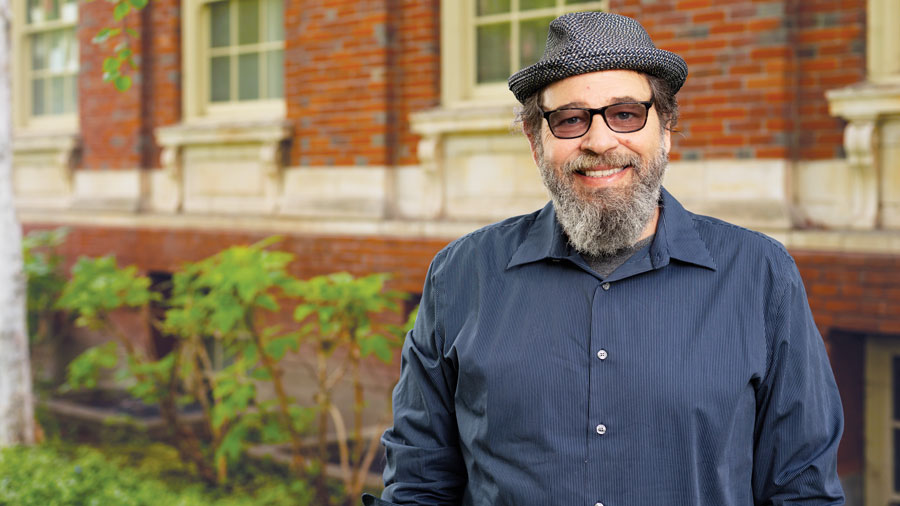Giving Empathy a Leading Role
Film & Media Professor Tarik Elseewi Relishes the Meaningful Conversations He Has With his Students
By Jared Scott Tesler
Photography by Kim Fetrow of Kim Fetrow Photography ’96

Born in Riverside, California, but raised in Egypt through the age of seven, Tarik Ahmed Elseewi first became interested in the idea of representation as a young boy. Depictions of the Arab experience in the cartoons, television series and films he watched during his formative years were a far cry from life as he knew it.
“I knew that something was wrong, demeaning, degrading about the representations. Whether it was murderous ‘genies’ on ‘The Bugs Bunny Show’ or a blonde genie from ‘the Orient’ on ‘I Dream of Jeannie,’ it became clear to me even before I could distinctly express it that Arabs and Egyptians were a plaything for the fiction writers of Hollywood and Broadway,” Elseewi says.
“An important TV show for me as a child was ‘Kung Fu,’ in which a half-Chinese kung fu fighter traveled through 19th-century California fighting off racists. That was the first time I realized that it wasn’t just Middle Easterners who were subject to racism and racial trauma.”
At Whitman, Elseewi, Associate Professor of Film and Media Studies and Director of South Asian and Middle Eastern Studies, takes great pride and joy in introducing students to Middle Eastern film and media, which he studied intensively while pursuing his Master’s and doctorate at the Moody College of Communication at the University of Texas at Austin.
“It’s truly a wonder to watch students engage profoundly with cultural productions from a very different standpoint—politically, socially, formally and aesthetically—than what they grew up with,” Elseewi says. “Most students are transformed by the process at some level—not necessarily transformed into different people, but they grow from encountering difference.”
Going There Together
As a professor, Elseewi is tasked with imparting knowledge. For the upcoming academic year, he will teach: Introduction to Television Studies, The Middle East in Media, Film and Media Studies Theory and Senior Seminar. But the single most important—and rewarding—aspect of his work, he says, is fostering empathy while engaging young people in intellectual conversations of great interest and importance, such as questions of identity, representation, race, and the intersection of media and politics.
“It’s often difficult. We have to talk about really difficult subjects, like racism, homophobia and sexism, and not everyone always wants to go there,” Elseewi says. “But those difficulties hopefully keep my mind sharp and my classes relevant.”
No matter the conversation, he models empathy by listening to students and caring about what they have to say—valuing their thoughts, ideas and beliefs.
“It must be remembered that before I was a professor, I, too, was a student—and I still am. I know what it’s like to have ideas and to have someone I respect take those ideas seriously,” Elseewi says, citing his earlier work as a writer, an editor, a public affairs specialist, a barista and an administrative assistant.
“I teach media, not astrophysics, which means that my object of study is not something that requires a Ph.D. to encounter but is instead encountered by everyone every day. Students might not have my years of experience in theorizing media, but they have a whole lifetime of engaging with it, having ideas about it and being shaped by it. I ask them questions and have conversations with them as if they were—because they are—humans with interesting perspectives!”
In 2022, Elseewi was honored for his outstanding dedication to his students—from “nervous and quiet first-years” to “expressive and bold seniors” and everyone in between. He received the George Ball Award for Excellence in Advising, established in 1995 with gifts from the Whitman College Family Association.
“That award was a big deal to me. The most important part of my job, as far as I’m concerned, is working with students. The rest—committee work, publishing, acting intellectual—is important but only exists because of students,” he says.
“It feels wonderful to be recognized by students as someone who listens and someone who cares.”